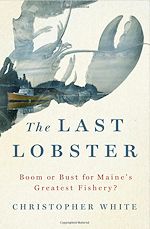  The Last Lobster
The Last Lobster
Boom or Bust for Maine's Greatest Fishery?
Christopher White
St. Martin's Press, 2018, HC, 256 pp, $26.99
Christopher White has written a well-rounded account of the plight of lobstermen and fishermen in Maine. In his book, White investigates the possibility of the effect of global warming on the lobster industry. There was as White would say a "glut" of lobsters in 2016; the population so great that it affected the supply and demand. Too many lobsters actually drive the price down, and they end up languishing at the docks. What was the reason for the glut? How long until the decline? These are the questions White poses.
The charming aspect of White's book is the anecdotal accounts from the lobstermen themselves. White enmeshes himself into a small town whose economy is based on the lobster industry. He goes out trapping with the lobstermen, learning the ins and outs of the labor intensive business. On the smaller boats it's basically a two man operation, the captain and the sternman.
On one boat, captained by Julie Eaton, she says of her sternman Derrick, "Derrick does most of the heavy lifting, but I do the heavy thinking", and while it is true that the captain has to make the tough decisions, where to drop the lobster pots for one, White notes that it is an equal share of labor. Julie states "I'm not a female lobsterman, nor a lobsterwoman. I'm a lobsterman. I do everything on a boat that the guys do. I've been working it for twenty years, and I've earned my stripes."
White seems to love the taciturn nature of Mainers, often noting some of their dry humor. In one instance he asked a young shop girl if she had lived there all her life and her response was "not yet". He also quotes a Maine standby "no telling, not knowing". This is often in response to the climate change debate. Many of the lobstermen are not convinced that climate change is effecting the lobster population. White investigates this with science and statistics.
Over fishing of cod, allowing for a lack of predation, as well as the warming of the gulf of Maine made for high reproductive rates with female lobsters. The lack of predation also allowed for the lobster larvae to grow with impunity. The warming of the gulf has also precipitated the migration of the lobsters northward. The lobstermen are confined to fish in zones, as the lobster march north; the previous zone suffers the loss. This will also affect the fishing between the Canadian and Maine boarders. Unfortunately this can cause lobster "wars" where trap lines are cut and violence can ensue.
In The Last Lobster, White drills down into these issues and more, including the pros of co-opting, and the possibilities of unionizing. While it is at times hard to face some of the facts of climate change, it is necessary in order that this industry as well as fishing industries around the world can be sustained. White's book is a tough look at global warming, as well as an entertaining peek into the resilient Maine lobstermen who work the ocean.
|